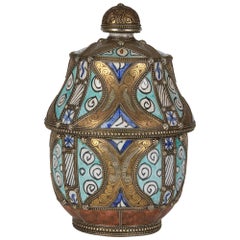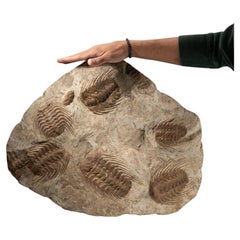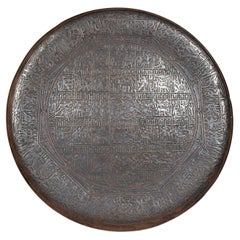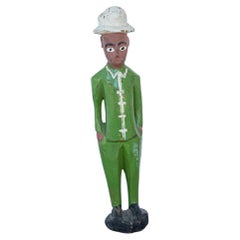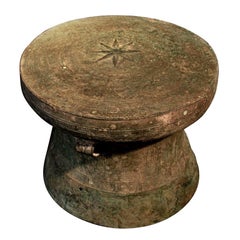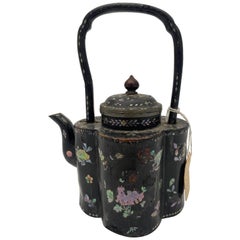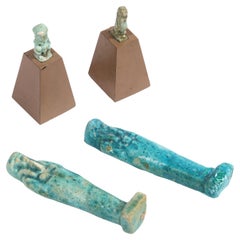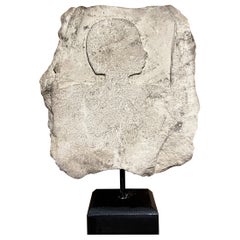North African Antiquities
to
2
2
1
4
1
1
1
2
1
1
1
3
1
1
1
1
6,626
1,870
1,325
736
387
4
4
4
Place of Origin: North African
Antique Moroccan Jobbana Ceramic Lidded Butter Pot
Located in Bishop's Stortford, Hertfordshire
Antique Moroccan 'Jobbana' ceramic lidded butter pot glazed with blue, turquoise and orange with black patterned outlines on a white ground decoration with ...
Category
Early 20th Century North African Antiquities
Materials
Metal
Selenopeltis Trilobite Fossil from Morocco (18 Inches, 38.4 lbs.)
Located in New York, NY
Trilobites, an early arthropod relative of spiders, horseshoe crabs, and scorpions, preserved in this level of detail only occurred as a result of very sudden underwater landslides c...
Category
15th Century and Earlier Antique North African Antiquities
Materials
Other
$5,200 Sale Price
20% Off
Egyptian Copper Plate with Silver Inlay Hieroglyphics, Early 19th Century
Located in Islamabad, PK
The large-scale copper charger plate with silver inlay is a truly awe-inspiring work of art. Its grand size and intricate design make it a captivating piece that commands attention a...
Category
19th Century Egyptian Antique North African Antiquities
Materials
Silver, Copper
Statue of Man African Art
Located in Milano, IT
Beautiful painted wood statue from the 50's, belonging to African art.
The statue of a man African art is made entirely of painted wood, depicts a man with...
Category
1950s Arts and Crafts Vintage North African Antiquities
Materials
Wood
$465 Sale Price
20% Off
Related Items
Dong Son Culture Ritual Bronze Drum, 4th-3rd Century BC, Vietnam
Located in Austin, TX
A well cast and intricately decorated bronze drum from the Dong Son culture, circa 4th - 3rd century BC, Red River Delta, Vietnam.
The face of the drum features a central 8 pointed...
Category
15th Century and Earlier Antique North African Antiquities
Materials
Bronze
18th Century Chinese Lacquer Mother of Pearl Inlay Pewter Teapot
Located in Brea, CA
18th century Chinese lacquer mother of pearl inlay pewter teapot, height to handle top 8 inch, floral decoration as expected for age an...
Category
Early 18th Century Chinoiserie Antique North African Antiquities
Materials
Mother-of-Pearl
Bixia Yuanjun Figure of Bronze Dated Ming Dynasty, 1368-1644
Located in London, GB
Bixia Yuanjun figure of bronze dated Ming Dynasty 1368-1644.
Base of hardwood.
Height excluding base 26cm;
Heigh including base 31cm.
Condition:
Corrosion on reverse/back;
...
Category
15th Century and Earlier Ming Antique North African Antiquities
Materials
Bronze
Pair Chinese Cloisonné Fu Dogs
Located in Houston, TX
Copper base cloisonné Fu Dogs made for Chinese export with gilded, mane, ears and accents. This pair from 1910s or earlier.
Category
Early 1900s Chinese Export Antique North African Antiquities
Materials
Copper
Khmer Bronze Hairpin
Located in Vosselaar, BE
Elegant and refined Khmer bronze hairpin dating between the 12th and 15th century.
Category
15th Century and Earlier Antique North African Antiquities
Materials
Bronze
12th Century, Angkor Vat, A Pair of Antique Khmer Bronze Hand Bells with Stand
Located in Sampantawong, TH
A pair of Khmer bronze hand bells with very nice patina.
Age: Cambodia, Angkor Vat Period, 12th Century
Size: Height 12.8 - 14 C.M. / Width 6.5 - 7.8 C.M.
Size including stand: Heig...
Category
15th Century and Earlier Antique North African Antiquities
Materials
Bronze
$1,072 Sale Price / set
20% Off
H 9.85 in Dm 3.08 in
Pair of Cloisonné Bronze Vases, Japan, Circa 1900
Located in Saint-Ouen, FR
Pair of cloisonné bronze vases, Japan, circa 1900, accident on one, slight depression
Measures: H 19cm, D 10cm.
Category
20th Century Japonisme North African Antiquities
Materials
Bronze
6 Antique Chinese Cloisonne Teapots
Located in Brea, CA
Collection of 6 Chinese cloisonne teapots in varying shapes and designs of flora and fauna. The highest one is 5.5'' H x 2 W x 2.5'' D. the sm...
Category
20th Century Chinese Export North African Antiquities
Materials
Bronze
Antique Small Chest of Drawers from 19th Century, Japan
Located in Tokyo, Tokyo
Antique small chest of drawers from Edo period (1603-1868), Japan.
Because of its age, the chest shows signs of use, which in turn make...
Category
19th Century Antique North African Antiquities
Materials
Iron
Archaic Chinese Bronze Ritual Vessel, Gui, Early Western Zhou, 11th century BCE
Located in Austin, TX
A stunning and rare Chinese archaic bronze gui, a type of ritual bronze vessel used to hold grain, either for feasting, or for making offerings ...
Category
15th Century and Earlier Archaistic Antique North African Antiquities
Materials
Bronze
$48,000
H 5.13 in Dm 10 in
Japanese Bronze Vessel with Dragon Handles and Falcon Lid
Located in Greenwich, CT
Japanese bronze vessel with pair of dragon handles, falcon lid, birds in landscape and elephant heads base.
Category
1890s Meiji Antique North African Antiquities
Materials
Bronze
Early 20th Century Silver Engraved Chinese Comb on Stand
Located in Jimbaran, Bali
An early 20th century Chinese silver comb with engravings, mounted on a stand.
Dimensions; Height with stand 21cm / Height 10cm x Width 23cm D 0.04cm.
Category
Early 20th Century Qing North African Antiquities
Materials
Silver
$596 Sale Price
20% Off
H 3.94 in W 9.06 in D 0.02 in
Previously Available Items
Set of Four Egyptian Antiquities, Pair of Sarcophagus Faience & Two Figurines
Located in New York, NY
This captivating authentic Egyptian Faience set was realized in ancient Egypt circa 3100 BCE. It offers two sarcophagus figurines- suggestive of miniature versions of King Tut's tomb- hand finished in a beautiful turquoise hue (a glaze created by pulverizing the stone into pigment). Additionally, the set features two figurines (one representative of the Egyptian god Anubis), and the other seemingly a depiction of one of the ruler's as a young child also in a turquoise glaze atop volumetric rhombus plinths with tapered sides in a refined terra cotta hue. Full of historical importance (and stunning as stand alone objects) this collection of Egyptian antiquities...
Category
15th Century and Earlier Egyptian Antique North African Antiquities
Materials
Faience
H 2 in W 1.25 in D 1.25 in
Egyptian figurative limestone architectural fragment
Located in Vosselaar, BE
A fragment of a trial piece of a relief with the upper body and head of a male figure with cropped hair facing right. New Kindom 1550-1070 bC. Acquired on the London art market 2022.
Category
15th Century and Earlier Egyptian Antique North African Antiquities
Materials
Limestone
Egyptian limestone architectural fragment
Located in Vosselaar, BE
A fragment of a rectangulare limestone panel from a larger relief with a portion of a extended arm holding a was sceptre. New Kindom 1550-1070 bC.
Category
15th Century and Earlier Egyptian Antique North African Antiquities
Materials
Limestone
Ancient Antique 16th Century Islamic Calligraphy Mamluk Glass Mosque Lamp 1500
Located in Portland, OR
A rare and ancient Mamluk period Islamic handblown glass mosque lamp, Egypt or Syria, early 1500's.
The lamp of diminutive form & having a flared neck with Islamic calligraphy, the g...
Category
16th Century Islamic Antique North African Antiquities
Materials
Glass
Ancient Egyptian Purple Amethystine Quartz Ointment Vase
Located in London, GB
From the Old Kingdom onwards, many descriptive wall reliefs and paintings can be found depicting the production of various stone vessels . We can infer from these portrayals that the...
Category
15th Century and Earlier Antique North African Antiquities
Materials
Stone
Bronze Osiris
Located in London, GB
This statuette is in keeping with the canonical iconography of Osiris: in his hands, he holds the flagellum, the nekhekh and hekat scepters, and on his head he wears his usual atef c...
Category
15th Century and Earlier Antique North African Antiquities
Materials
Bronze
Figure of Onuris
Located in London, GB
This arresting Egyptian bronze depicts Onuris, the god of war and patron of the army. He stands with his leg foot stepping forwards, his muscular arms set in a powerful pose. His rig...
Category
15th Century and Earlier Antique North African Antiquities
Materials
Bronze
Head of Anubis
Located in London, GB
Anubis the God of Death is among the most iconic gods in ancient Egypt and people during this time knew him as Anpu or Inpu. Anubis is among the oldest deities whose mentioning can b...
Category
15th Century and Earlier Antique North African Antiquities
Materials
Wood
Large Faience Ram
Located in London, GB
Strikingly similar to the Romano-Egyptian Ram currently in the Met this piece depicts a ram, with a highly textured and naturalistically modelled coat, curled horns and a static forw...
Category
15th Century and Earlier Antique North African Antiquities
Materials
Ceramic
The 'Gillot' Taweret
Located in London, GB
This statuette represents the goddess Taweret, an apotropaic goddess, whose domain was the protection of pregnant women and their babies, especially during childbirth. Her threatenin...
Category
15th Century and Earlier Antique North African Antiquities
Materials
Limestone
Ushabti of 'Paser'
Located in London, GB
An Ushabti is a funerary figurine used throughout ancient Egypt, placed in a tomb to aid as a servant to the deceased, conducting manual labour for them...
Category
15th Century and Earlier Antique North African Antiquities
Materials
Limestone
Ushabti of 'Kenj'
Located in London, GB
The XIX Dynasty of Ancient Egypt was part of the Egyptian New Kingdom and was founded by Vizier Ramasses I, whom Pharaoh Horemheb chose as his successor to the throne. The XIX Dynasty is best remembered for its military conquests in the lands of Canaan. The relative peace of the XVIII Dynasty gave way to a century of wars, which produced art that attempted to maintain ancestral traditions in order to claim its dynastic lineage and succession to the throne.This large serpentine statue tells of the prominence of administrative art during this period. The figure is an ushabti, a funerary statue that would have been placed in a tomb among the grave goods of the inhabitant, intended to act as a servant for the deceased in the afterlife. The ushabtis would be called upon to perform their menial tasks, each figure's purpose is often attested to by objects in their hands, such as bread-baker holding grain or farmer holding a scythe, and they would be donated by the workers of the deceased to fulfill their roles for them in death. Hieroglyphics could often also be found running the length of their legs giving further clues to their roles and stating whom they intended to work for. These inscriptions were called answers and asserted the figures readiness to be summoned to the gods work The practice of placing ushabtis inside tombs originated in the Old Kingdom, with the earliest evidence from the middle of the third millennium B.C. when they buried next to mummies[2]. They are normally miniature in size, of hard stones such as limestone, granite or serpentine (and occasionally of faience or bronze), and produced in multiples to provide the important deceased with an army of workers. Sometimes so many were produced that they world cover the entire surface floor of a tomb. Due to this commonness, many extant examples survive, in varying qualities, and as a collection of artifacts they provide a unique insight in to the fascinating death customs of the Ancient Egyptians, highlighting their very real belief in an eternal afterlife.This beautifully carved statue holds hoes and a seed sack, indicating they were destined for manual toil in the eternal afterlife amongst the fields growing grain to produce food for the interred. Another agricultural implement with crisscrossing ropes is tucked in to the back of the figure's kilt, making sure he is ready for any farming situation necessary. He wears a long-sleeved shirt with a long pleated kilt, which has a large over-fold and broad beaded collar. He also wears a double wig composed of zig-zags and echeloned curls, and his face has a slightly aquiline nose, with almond-shaped eyes a fixed, determined gaze.A column running the length of his over-fold contains five lines of hieroglyphic inscription that name the owner of the worker (Kenj), and recite chapter VI from the Ancient Egyptian Book of...
Category
15th Century and Earlier Antique North African Antiquities
Materials
Granite
Recently Viewed
View AllMore Ways To Browse
Large Chinese Celadon Pots
Han Dynasty Court Lady
Palanquin Handles
Sancai Phoenix
Schist Gandharan Buddha
Bactrian Stone
Chinese Coconut Cup
Han Dynasty Chinese Cocoon Jar
Han Dynasty Cocoon Jars
Han Dynasty Pig
Khmer Goddess
Kojima Shoten
Northern Qi Buddha
Yak Horn
Bronze Age Axe Head
Goblet Drum
Gong Cambodia
Haniwa Heads
